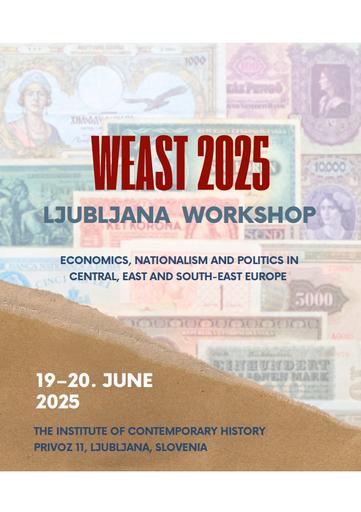/
Dogodki
/
Konference
Foreign businesspeople and economic nationalism in the Kingdom of Serbs, Croats and Slovenes
Examples from the Maribor Oblast (1924-1929)


To delo avtorja Oliver Pejić je ponujeno pod Creative Commons Priznanje avtorstva-Nekomercialno-Deljenje pod enakimi pogoji 4.0 Mednarodna
Datoteke (1)
Opis
While Yugoslav citizenship theoretically enabled all its holders the free and uninhibited pursuit of business in the interwar Yugoslav state, the establishment of a new company was more complicated for foreign businesspeople. During the 1920s, protectionist labour legislation subjected foreign petitioners for business licenses to intense background checks. While these investigations were intended to determine a petitioner’s professional qualifications as well as the economic justifications for their proposed enterprise, they were also done to rule out “national-economic reservations”. As a typical post-imperial nation-state, the Kingdom of Serbs, Croats and Slovenes pursued a nationalist economic policy aimed at empowering businesspeople belonging to the titular nation while also curbing the influence of ethnic Others within its economic sphere. The present paper uses the preserved administrative materials of the Maribor Oblast’s Department for Trade, Commerce and Industry to examine the role that perceived national credentials played in petitions for business licenses filed by foreign businesspeople in the second half of the 1920s. The paper approaches this issue from a twofold perspective. On the one hand, it analyses the presence of nationalist language in the discursive self-framing of petitioners as well as in the language of the administrators who were handling their petitions. On the other hand, it also examines administrative practices on the ground and assesses the extent to which national considerations affected practical decision-making at various levels of the administrative hierarchy. While a petitioner’s perceived nationality certainly played a role in their successes at obtaining a business license, the paper demonstrates that the higher authorities often dismissed the importance of national credentials and were willing to grant licenses to petitioners whose national credentials were deemed problematic by lower-ranking administrators.
Metapodatki (12)
- identifikatorhttps://hdl.handle.net/11686/71106
- naslov
- Foreign businesspeople and economic nationalism in the Kingdom of Serbs, Croats and Slovenes
- Examples from the Maribor Oblast (1924-1929)
- avtor
- Oliver Pejić
- soavtor
- Neja Blaj Hribar (mod.)
- predmet
- Maribor
- ekonomija
- gospodarstvo
- nacionalizem
- Jugoslavija
- SHS
- opis
- While Yugoslav citizenship theoretically enabled all its holders the free and uninhibited pursuit of business in the interwar Yugoslav state, the establishment of a new company was more complicated for foreign businesspeople. During the 1920s, protectionist labour legislation subjected foreign petitioners for business licenses to intense background checks. While these investigations were intended to determine a petitioner’s professional qualifications as well as the economic justifications for their proposed enterprise, they were also done to rule out “national-economic reservations”. As a typical post-imperial nation-state, the Kingdom of Serbs, Croats and Slovenes pursued a nationalist economic policy aimed at empowering businesspeople belonging to the titular nation while also curbing the influence of ethnic Others within its economic sphere. The present paper uses the preserved administrative materials of the Maribor Oblast’s Department for Trade, Commerce and Industry to examine the role that perceived national credentials played in petitions for business licenses filed by foreign businesspeople in the second half of the 1920s. The paper approaches this issue from a twofold perspective. On the one hand, it analyses the presence of nationalist language in the discursive self-framing of petitioners as well as in the language of the administrators who were handling their petitions. On the other hand, it also examines administrative practices on the ground and assesses the extent to which national considerations affected practical decision-making at various levels of the administrative hierarchy. While a petitioner’s perceived nationality certainly played a role in their successes at obtaining a business license, the paper demonstrates that the higher authorities often dismissed the importance of national credentials and were willing to grant licenses to petitioners whose national credentials were deemed problematic by lower-ranking administrators.
- založnik
- Inštitut za novejšo zgodovino
- datum
- 19. 06. 2025
- tip
- video
- jezik
- Angleščina
- jeDelOd
- pravice
- licenca: ccByNcSa
